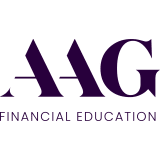This informal CPD article, ‘Five Top Tax Saving Tips in 2025’, was provided by AAG Financial Education (AAG). Founded in 1995, they provide long-term, comprehensive, and bespoke financial education to their clients.
Getting smarter with your money – how you save it, where you invest it, and how it can work for you – gives you greater confidence and control, whatever your age. Knowing how much you’re spending ensures you’re not missing out on tax-efficient savings or investments.
The Power of Tax-Smart Habits
Managing money effectively isn’t just about avoiding mistakes. It’s about making informed, proactive choices that enhance your financial security and emotional wellbeing. Hasty, last-minute decisions can lead to costly errors such as late payments, lost interest, or penalties. But establishing regular savings and money management habits can transform your financial outlook.
Here are five actionable tax-smart tips to help you make the most of 2025:
1. Maximise Your Allowances
Are you fully aware of the tax allowances and reliefs available to you? Beyond topping up your ISAs, consider other overlooked allowances and carry-forwards that could save you money. For instance:
- Pension Allowances: You can contribute up to £60,000 annually (or 100% of your earnings, whichever is lower) and carry forward unused allowances from the previous three tax years.
- Gifting: You can gift up to £3,000 tax-free annually, with an additional carry-forward from the previous year. You can also gift up to £5,000 tax-free for your child’s wedding or civil partnership, plus individual tax-free gifts of up to £250. These gifts fall outside your estate for inheritance tax purposes, provided you live for seven years after making them.
2. Assess Your Assets
When was the last time you evaluated your financial worth? Regularly checking the value of your pensions, savings accounts, ISAs, property, and premium bonds ensures your money is working for you. If you’ve changed jobs, you might have multiple pension pots. Additionally, ensure your emergency cash fund can sustain you and your family for up to six months if needed.
Understanding your financial position can help you make smarter decisions and reveal opportunities for tax savings.
3. Spring-Clean Your Subscriptions
Do you know how many subscriptions you’re paying for? From streaming services to gym memberships, these small expenses can add up over time. Review your spending and decide which services you still value. Cancelling unused subscriptions can free up money to invest in tax-efficient savings, such as ISAs or pensions.
4. Set Up Regular Contributions
Making monthly contributions to ISAs, savings accounts, or pensions is one of the simplest ways to stay ahead. Regular payments not only reduce the year-end scramble but also smooth out market volatility and changing interest rates. Even small amounts add up over time. The key is consistency – building a habit of saving regularly will benefit you in the long run.
5. Schedule Financial Health Checks
Setting aside time to review your finances weekly can save you time and money in the long term. Life is full of unexpected changes, and staying informed can make a significant difference to your financial stability.
Conclusion
Tax-smart financial planning is about more than just saving money; it’s about creating a secure and prosperous future. By following these five steps – maximising allowances, assessing assets, streamlining spending, setting up regular contributions, and scheduling regular financial reviews – you can take control of your finances and enjoy greater peace of mind.
Get started today and make 2025 the year you achieve financial confidence and clarity.
Disclaimer
The value of an investment will be directly linked to the performance of the funds selected and may fall as well as rise. You may get back less than the amount invested.
The levels and bases of taxation, and reliefs from taxation, can change at any time and are generally dependent on individual circumstances.
We hope this article was helpful. For more information from AAG Financial Education (AAG), please visit their CPD Member Directory page. Alternatively, you can go to the CPD Industry Hubs for more articles, courses and events relevant to your Continuing Professional Development requirements.













